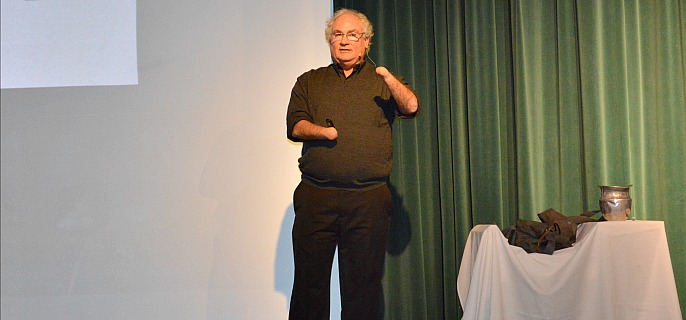
Mark Speckman, a former high school and college football player even though he was born without hands, stood on the stage at the Hermiston Community Center Saturday night holding onto a vase filled with water. As he spoke, he began to pour a few drops of water out, then stopped.
It was a visual metaphor with the vase as a person and the water as the person’s potential.
“Many people just pour out a little of their potential and then stop,” he said. “They just stop. The successful people pour every drop out until it’s empty.”
During Saturday’s Umatilla Electric Cooperative’s annual membership meeting, Speckman shared a lifetime of wisdom earned through hard work, imagination and a determination to not let his disability get in the way of living a successful life. He mixed a heavy dose of humor with his message throughout the evening, giving his audience plenty to laugh and think about.
The obvious question is how did this man, born without hands, achieve things that most people with hands could not?
“I figured it out,” he said.
Speckman was an honorable-mention NAIA All-American linebacker at Azusa Pacific and later went on to become a successful high school, college and professional football coach.
He is currently the offensive coordinator at Lawrence University in Appleton, Wisc., and was previously the running backs coach of the Montreal Alouettes of the Canadian Football League in 2013 and 2014. Speckman served as the head football coach at Willamette University from 1998 to 2011 and at Menlo College in 2012. As coach of the Willamette Bearcats, he led his team to three playoff berths at the NCAA Division III level.
Among the players he coached during his career was a young Jeff Garcia who went on to a successful career in the NFL. Early on, however, Garcia did not resemble a future NFL star.
“He was skinny, small, slow and weak,” Speckman said. “But, he had all the personal traits he needed to overcome his weaknesses.” He also had vision – something everyone needs to maximize whatever potential they may have.
“Helen Keller, born without sight, had the vision she need to accomplish what she did,” Speckman said. “All great winners, bosses, teams, companies have a vision.
Even with potential and vision, people don’t succeed on their own. Sometimes you have to know when to ask for help. Tying his shoes was always an impossibility, so he had to ask for help.
The problem became exasperated when he took up football. Shoes, pads, pants – they all have laces that need tied.
“I knew that if I didn’t ask for help, I’d never reach my potential,” he said.
Another key to success is the need to think outside the box, he said. What works for one person won’t necessarily work for another. He told the story of learning how to brush his teeth. It took trial and error, but he eventually figured it out.
He first squeezed the toothpaste onto the counter, then, holding the brush with the ends of his arms, wiped it off the counter with his toothbrush. Then his siblings complained about all the toothpaste on the counter. So then he squeezed the paste onto a plate. More complaints. After a few more failed ideas, he figured out he could put the handle of the brush in his mouth, and then, using both arms, squeeze the paste onto the brush.
“Problem solved,” he said. “I just had to figure it out.”










